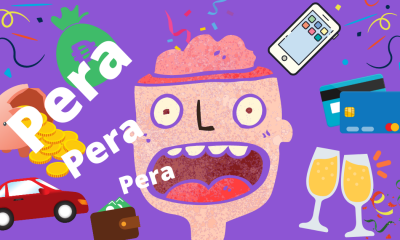Health
Tips on How to Feel Happier


Being happy may help you live longer.
Research shows that being happier doesn’t just make you feel better — it actually brings a host of potential health benefits. A study conducted by Yoichi and Steptoe (2008) recorded associations between positive well-being and longevity in both healthy people and those with a pre-existing health condition, such as heart or kidney disease.
The risk of death over the 30-year study period was 14% higher in unhappy individuals compared to their happier counterparts. Conversely, higher positive well-being was found to have a favorable effect on survival, reducing the risk of death by 18% in healthy people and by 2% in those with pre-existing disease.
How happiness lead to greater life expectancy may not be well understood yet. However, you will not stand to lose if you will aim to live a happier life.
The following tips will give you ideas on how you can be happy—-and ultimately, live longer.
Get a regular exercise
Having a regular, blood-pumping exercise releases endorphins throughout your whole body. This will create feelings of happiness that can combat any bad mood. Studies have even shown that exercise can help alleviate symptoms of depression. It doesn’t matter what physical activity you do—running, indoor cycling, yoga, dancing—it will help a lot as long as you break a sweat. Even a brisk 20- to 30-minute walk will help.
Be like Popeye, load up on leafy greens
Eat up a lot of dark, leafy greens such as spinach and kale are rich in folate because they provide 33% of the recommended daily allowance (RDA). Folate is linked to a decrease in negative moods and depression because it helps produce dopamine in the brain. One 2012 study found that middle-aged people who consumed the most folate had a lower risk of depression symptoms than those who ate the least.
Buy flowers for yourself
Researchers from Harvard conducted a study and found out that keeping fresh flowers at home is effective in keeping away anxiety and negative moods. People in the study also felt more compassionate toward others and they felt a boost of energy and enthusiasm at work.
Open the shades
Starting to feel down? Let some sunlight in your room. It can brighten your mood. When your workspace or living area is brighter, you tend to feel happier too.
Or go outside
Head outside to soak up some sunshine. The human body produces vitamin D when exposed to the sun’s rays, and research suggests that people who are deficient in the vitamin are more likely to be depressed, anxious, and tired. Step into the sunshine for 20 to 25 minutes of sunlight to lighten your mood naturally.
Consume happiness-boosting foods and drinks
-Turmeric
The active compound in turmeric, curcumin, has natural antidepressant qualities. You may already be adding turmeric to your meals because of its vast whole-body health benefits, such as lessening the effects of rheumatoid arthritis, osteoarthritis, and other inflammatory conditions, as well as fighting Alzheimer’s disease and diabetes. Animal studies have also linked curcumin to an increase in serotonin and dopamine, so it’s a powerful way to boost your mood.
-Chocolate
While you might not need another excuse to eat more chocolate, here’s another: It makes us happier. Chocolate contains tryptophan, which boosts the production of serotonin in the brain, leading to better moods. This trick also works with other foods containing tryptophan, such as poultry and eggs.
-Coffee
This morning energy boost doubles as a mood pick-me-up. A Harvard University study found that women who drank at least two cups of coffee regularly were at a 15% lower risk of depression than women who did not. Just keep in mind that those fancy coffee drinks can have tons of hidden sugar and calories, so it’s best to stick with black coffee (and some skim milk).
-Green tea
Green tea already boasts an impressive résumé of health benefits. Thanks to the polyphenols it contains, green tea helps with weight loss by boosting metabolism, as well as providing a reduced risk of heart disease, high blood pressure, certain cancers, and osteoporosis. But for your mood? Green tea has been shown to reduce stress levels. A study found that people who drank five or more cups of green tea per day had a 20% lower level of stress than those who drank less than one.
-Mushrooms
A surprising source of vitamin D? Mushrooms. The tasty vegetable is the only plant source of natural vitamin D, and foods that contain vitamin D boost serotonin in the brain, putting you in a better mood. It’s easy to increase your intake of vitamin D this way—throw some mushrooms into your breakfast omelets or lunchtime salads
-Healthy fats
You know how avocados are some of the most pleasurable foods to eat, with their rich taste and smooth, decadent texture? That’s a mood-booster on its own, but research also suggests that their fat content is also the reason why they better our mood. Because fat slows digestion, it evens our blood sugar levels leaving us to feel calm and satisfied. So go ahead and treat yourself to some avocado or nuts next time you’re feeling anxious.
-Salmon
Fatty fish like salmon is high in omega-3 fatty acids, which can help stave off depression (omega-3s are also present in avocados and nuts, as well as grass-fed beef and chicken). This is because they help to maintain brain function in the areas that regulate mood and emotion—a study found that women who hate fish two times per week had a 25% lower risk of depression than women who ate it less often. If you don’t like to eat fish, try taking omega-3 fish oil supplements instead.
Play with your pet
Your furry pets like dog or cat can seriously improve your quality of life. Their excitement in seeing you come home and their unyielding loyalty make them great companions. There are a host of reasons why pets improve your health, but they can turn around a bad mood and make you happier in no time. A study found that petting a dog for only 15 minutes releases serotonin, prolactin, and oxytocin—all of which are mood-enhancing hormones, while lowering the stress hormone cortisol.
Listen to music…
Have you ever heard a song over the radio that just felt good? Or have you turned on an old CD only to find a flood of happy memories come streaming back? Well, that’s due to the fact that music is a mood-booster. It releases the feel-good chemical dopamine into your system and brings on nostalgia.
…And sing along
You can also get happy by making your own music—by singing. University of Manchester researchers discovered that a tiny organ in the inner ear (called the sacculus) is connected to a part of your brain that registers pleasure. The sacculus registers frequency notes that are associated with singing almost instantly, giving you a warm and fuzzy feeling. So go ahead and sing in the shower, belt it out in your car, or get up on that karaoke stage.
Make a human connection
Put down your smartphone and take a step back from your computer screen. If you want to feel better—and fast—go to a friend or family member for some relief. A study from the University of North Carolina at Chapel Hill found that human touch releases those feel-good chemicals like serotonin, as well as reduces blood pressure and heart rate making you feel more relaxed.
If all else fails, fake it
While you may think of smiling as a reaction to feeling happy, some researchers suggest that smiling can also lead to joy. The simple act of smiling—even if you have to force it—might help to activate the happiness centers in your brain, leaving you in a better mood.
Source: www.health.com.






